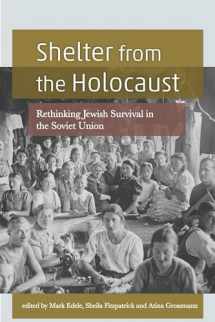
Shelter from the Holocaust: Rethinking Jewish Survival in the Soviet Union (Title Not in Series)
Book details
Summary
Description
About 1.5 million East European Jews-mostly from Poland, the Ukraine, and Russia-survived the Second World War behind the lines in the unoccupied parts of the Soviet Union. Some of these survivors, following the German invasion of the USSR in 1941, were evacuated as part of an organized effort by the Soviet state, while others became refugees who organized their own escape from the Germans, only to be deported to Siberia and other remote regions under Stalin's regime. This complicated history of survival from the Holocaust has fallen between the cracks of the established historiographical traditions as neither historians of the Soviet Union nor Holocaust scholars felt responsible for the conservation of this history, which at best is pushed to the margins and often silenced or forgotten altogether. With Shelter from the Holocaust: Rethinking Jewish Survival in the Soviet Union, editors Mark Edele, Sheila Fitzpatrick, and Atina Grossmann have compiled essays that are at the forefront of developing this entirely new field of transnational study, which seeks to integrate scholarship from the areas of the history of the Second World War and the Holocaust, the history of Poland and the Soviet Union, and the study of refugees and displaced persons.
Life as an escapee of the Holocaust was terribly difficult and often lethal, but it at least offered the opportunity for survival and, therefore, an experience fundamentally different than the systematic genocide the Nazis unleashed on those left behind in the territories under their control. What became of these survivors varies greatly-some joined Soviet Jewish evacuees in harsh exile in Central Asia; some Polish Jews evacuated to Iran in 1942 with the exile Anders Army, moving on to Palestine; most were eventually repatriated to postwar Poland, and many of them then fled further to displaced persons camps in allied-occupied Europe, where they constituted the largest group of East European Jewish survivors. Shelter from the Holocaust addresses these very different paths in seven chapters, beginning with a general overview of migration patterns, including a specific example of postwar memory focusing on those who ended up in Australia. The book continues with an exploration of the diverse ways Polish Jewish survivors talk about their experiences and identity with regard to the Holocaust, and ends with one family's personal narrative of experiences in Uzbekistan during World War II.
Shelter from the Holocaust came to fruition as the result of the opening of formerly classified Soviet and Polish archives, determined efforts to interview the last remaining Holocaust survivors, and the growing interest in the histories of displaced persons and migration. This pioneering volume will interest scholars of eastern European history and Holocaust studies, as well as those with an interest in refugee and migration issues.


We would LOVE it if you could help us and other readers by reviewing the book
Book review



